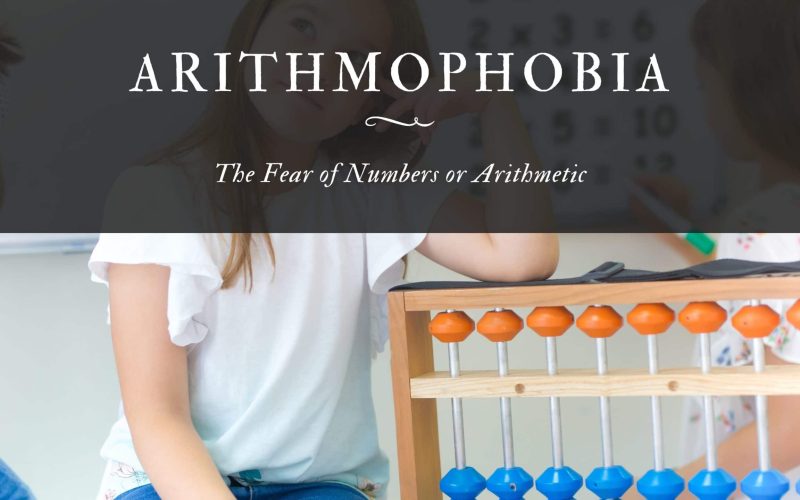The aritmophobia is not as popular as many other phobias, and that explains why you probably haven’t heard about it before now. This condition is a pathological fear of mathematics , arithmetic, or numbers.
This condition, also called numerophobia, constitutes an anxiety disorder in which the victim fears persistently, abnormally, and unjustifiably any stimulus that is related to mathematical equations and calculation.
Arithmophobia is one of the disorders identified as specific phobias. Thus, this phobia is very common with other phobias, such as the pathological fear of flowers, spiders, blood, or heights.
Nowadays, it is adequately documented that this phobia can affect various areas of life in a significant manner, especially work or study.
However, it can be complex and challenging to carry out daily tasks such as calculating expenses, drawing up a budget or managing the family’s economy can be a sure highly tricky situation for a person dealing with arithmophobia.
At present, there is adequate documentation about cases of arithmophobia. Likewise, there have been postulations of psychological therapies that are used in the treatment of this phobia and produce satisfactory outcomes.
Below, we will discuss the disorder’s characteristics, the factors that can trigger it, and the possible treatment that should be used.
What Are the Characteristics of Arithmophobia
Arithmophobia is not only considered a phobia, but also and anxiety disorder. As mentioned earlier, it is categorized as a form of the specific phobias diagnostic category.
All specific phobias are well documented and defined by an irrational or excessive fear of a particular stimulus.
In the case of arithmophobia, the object of fear is calculus, mathematics, numbers, or arithmetic. In this manner, the arthimophobic person suffers from a fear of any or all of these elements in a way that is considered disproportionate.
This fact is interpreted as a very high anxiety response each time the individual thinks about or gets exposed to elements that have to do with numbers or mathematics.
For instance, people with arithmophobia will get very nervous when solving a mathematical equation.
Asides this, the phobia of any of these elements is so high that the person who has arithmophobia will attempt to avoid them by all means possible. For this reason, this fear of number can affect and cause significant harm to the day to day life of the person who is dealing with arithmophobia.
Thus, we cannot categorize sudden nervousness when faced with a math equation as a case of arithmophobia. Still, we can classify it as one when there is an extreme and intense fear of things related to arithmetic over an extended period.
Unlike many other types of phobias, this one can be quite disabling, since we all have to deal with mathematical equations on a day to day basis either when we spend money or have to calculate how many hours we have spent on the road.
It is almost unavoidable to calculate when we need to determine how much a purchase will cost or when we use mathematics at work or in studies.
All these are not separable from our daily lives as humans. Still, an individual who has arithmophobia will be completely unable to handle them and will stay away from them altogether.
The Fear of Numbers
It is a well-established fact that not all kinds of anxiety can be called a phobia. Before we can talk about phobia, there is a need for experimentation with a specific type of fear.
This is also the situation with arithmophobia, so it is vital to note that merely fearing mathematical calculations doesn’t necessarily imply the presence of the phobia or disorder.
To be able to conclude that a person has arithmophobia, the fear of stimuli that is related to mathematics, numbers, and arithmetic must be on the high side. But there are also a series of requirements that must be met.
Disproportionate
Obviously, the deep fear of arithmetic and numbers is not proportional to the demands of the situation.
We all can agree that a simple arithmetic operation leads to a harmless condition without fear and anxiety as a response.
However, mathematical equations and operations may often be linked to more demanding situations.
A vital math exam that is made complicated, a delicate labor operation, sensitive management of the family economy, and so on.
The experimentation of restlessness or fear in these circumstances doesn’t necessarily define the existence of arithmophobia.
For fear to be associated with the disorder, that fear must have appeared in any situation where the trigger is involved and must be very high in all conditions.
Irrational
The fear of numbers or mathematics is irrational because, in real life, math should not be a reason to be frightened or responsible for any element of fright.
However, in cases of arithmophobia, the so-called fear of numbers is known to be irrational, even for the person who suffers from it.
The person with arithmophobia will not find a justification or excuse for his fear or even identify what elements of math cause fear.
He will find himself experiencing sensations of anxiety each time he is exposed to these triggers or stimuli without ever being able to explain the reason for the feeling.
Uncontrollable
The fear of arithmophobia is not only irrational but also an uncontrollable one. For this reason, people who have this form of anxiety or phobia can’t stop experiencing it even when they know they have no logical reason to do so.
This is a factor that highlights the complexity of the phobia and that the disorder can be a life-changing psychological alteration.
The person with arithmophobia cannot stop his fear of mathematics so that it will call for specialized treatment.
Leads to Avoidance
People who have arithmophobia live their lives feeling so much fear and in great anguish.
The sudden feelings of anxiety that tags, along with the experience of being exposed to numbers, are quite high and lead to a very massive amount of discomfort.
Due to how intense the phobia a person feels is, individuals who have arithmophobia completely stay away from any situation related to math.
They will do all they can to avoid performing any mathematical calculations and also to avoid the discomfort it causes them.
This single element is arguably the most disabling of the disorder because it can modify the actions or behavior of the person and mess up their day-to-day life.
Thus, people who have arithmophobia will need psychological treatment to stop their fears from being a problem.
Persists Over Time
Arithmophobia is a disorder involving the persistent fear of numbers because it is not transient.
People with a mortal fear of mathematics or in particular episodes of their lives do not have arithmophobia.
In contrast, people who have numerophobia report these fears continuously. This is serious because the fear of numbers will never vanish if they are not treated.
It is Maladaptive
Non-pathological fear of numbers has an apparent adaptive component that assists the person in gaining better adaptation to situations that need an anxiety response.
Obviously, this is not the situation with arithmophobia since the phobia of mathematics does not give an individual a chance to adapt better.
On the contrary, the fear of numbers will be a significant barrier in various aspects of a person’s life.
It is Not Specific to a Certain Age
It is not uncommon for different types of fears to flourish with more ease during adolescence or childhood. However, arithmophobia is not an age-specific fear or condition.
The individual who has a great fear of numbers from an early age will always have that fear if they respond to this manner of specific phobia.
Symptoms of Arithmophobia
Excessive, uncontrollable, irrational, persistent, and maladaptive phobia of math, numbers, and arithmetic triggers a series of manifestations. Arithmophobia leads to alterations in the three planes of a human person.
Both the physical, behavioral, and mental components are affected by fear or disorder. Arithmophobia is mainly explained via the anxiety response that the sufferer makes when they are exposed to the feared elements.
Physical Symptoms
When a person who has arithmophobia is exposed to situations that are related to arithmetic or mathematics, he performs a serious anxiety response.
Just like all other anxiety responses, this implies apparent modifications in the physical functioning of the person.
Specifically, the sufferer will present symptoms related to an increase in the functioning of the central nervous system.
The symptomatology may be variable in individual cases, but usually, some common manifestations may be any of the following:
- Increase in the cardiac rate
- Increase in the respiratory rate.
- Increased sweating
- Pupillary dilation
- Increase in muscle tension
- Headaches or belly
- Feeling of unreality
- Nausea.
Psychological symptoms
Physical symptoms are not standalone, as related cognitions and thoughts usually accompany them. These elements are nourished with the physiological manifestations and top the intensity of the anxiety.
The patient’s thoughts about the feared elements can be very diverse. However, they are always characterized by fear, negative attributes, and disability.
The individual with arithmophobia can think about how disturbing the mathematical equation or operation is, the danger the equation poses to him, or the individual incapacity he presents to face it.
Also, more elaborate distorted memories or thoughts may appear, like the association between math and self-harm, ridicule, or the display of weaknesses.
Behavioral symptoms
The psychological and physical anxiety that is caused by arithmophobia greatly affects how an individual behaves.
The most common action is usually avoidance, so the sufferer tries all things possible not to take part in any situation where arithmetic is present.
Likewise, impulsivity, agitation, or flight behavior can show up when the person cannot avoid the element he fears and must face it.
Diagnosis
There is no lab test for the diagnosis of this and other phobias. Thus, the diagnosis of arithmophobia as an anxiety disorder has to be done by a trained mental health professional.
There are specific criteria that must be followed to determine the presence of arithmophobia, and they are:
- The presence of intense anxiety or fear for a specific situation or object related to arithmetic or mathematical calculation.
- The object that triggers the phobic situation almost always leads to fear or instant anxiety.
- The object of the phobia can be resisted or actively avoided with fear or intense feelings of anxiety.
- The fear or anxiety is disproportionate to the real danger posed by the particular object, situation, and sociocultural context.
- Fear, avoidance, or anxiety is persistent and usually lasts at least six or more months.
- Fear, avoidance, and anxiety cause clinically significant deterioration or discomfort in social, occupational, or other vital areas of functioning.
The disturbance that is experienced is not better explained by the symptoms of a separate mental disorder, such as fear, anxiety, and avoidance of situations that have to do with panic symptoms or other disabling symptoms (like in the case of agoraphobia); circumstances or objects that are related to obsessions (like in the case of obsessive-compulsive disorder); or social situations (like in the case of social anxiety disorder); memory of traumatic events (like in the case of post-traumatic stress disorder); leaving home or separation of figures of attachment (like in the case of separation anxiety disorder).
Causes of Arithmophobia
Currently, it is assumed that there is no specific cause for arithmophobia, but different elements may work together in the development of mental disorders.
Most studies reveal a unique role played by environmental elements. And the genetic factors, in this case, seem to be in the background.
In this case, the experience of a traumatic experience concerning figures could motivate the exhibition of phobia.
Likewise, acquiring visual or verbal information about harmful components of arithmetics or mathematics could also have an influence.
Finally, it is important that the avoidance of the element they fear would be the major factor that explains both the strengthening and maintenance of the phobia.
Treatment
Arithmophobia can damage the life of the person dealing with it to a large extent and significantly reduce its functioning.
For this reason, it is especially vital to intervene with this kind of phobia since it can otherwise have negative consequences.
The treatment that has proven to be most effective in treating this phobia is psychotherapy. Except in situations where the state of anxiety is very high, it is discouraged to first engage in treatment with drugs.
Regarding psychological interventions, the method that has shown the best efficacy is cognitive-behavioral treatment, presenting the highest recovery rates.
In this treatment method, the sufferer is exposed to the object of his fears and made to associate them with good thoughts and feelings.







